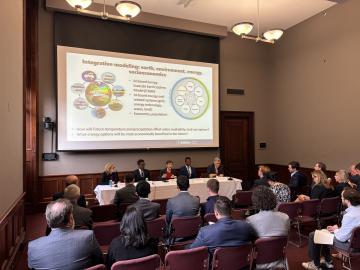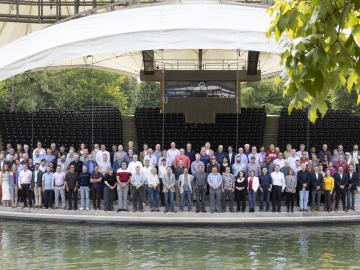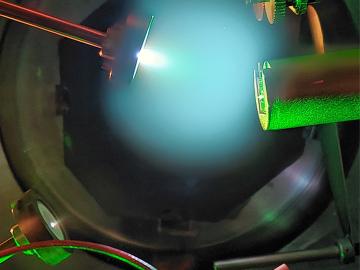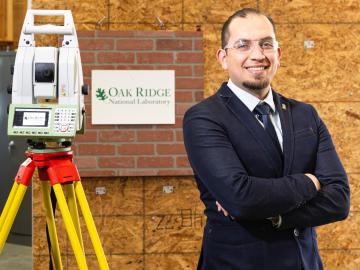
Filter News
Area of Research
- Advanced Manufacturing (2)
- Biology and Environment (47)
- Biology and Soft Matter (1)
- Computational Biology (1)
- Computational Engineering (2)
- Computer Science (8)
- Electricity and Smart Grid (3)
- Energy Science (137)
- Functional Materials for Energy (1)
- Fusion and Fission (12)
- Isotope Development and Production (1)
- Isotopes (4)
- Materials (57)
- Materials for Computing (10)
- Mathematics (1)
- National Security (21)
- Neutron Science (20)
- Nuclear Science and Technology (6)
- Quantum information Science (3)
- Sensors and Controls (1)
- Supercomputing (54)
- Transportation Systems (2)
News Topics
- (-) Artificial Intelligence (131)
- (-) Clean Water (33)
- (-) Grid (74)
- (-) ITER (9)
- (-) Microscopy (56)
- (-) Space Exploration (26)
- (-) Transportation (103)
- 3-D Printing/Advanced Manufacturing (146)
- Advanced Reactors (40)
- Big Data (79)
- Bioenergy (112)
- Biology (128)
- Biomedical (73)
- Biotechnology (39)
- Buildings (74)
- Chemical Sciences (86)
- Composites (35)
- Computer Science (226)
- Coronavirus (48)
- Critical Materials (29)
- Cybersecurity (35)
- Education (5)
- Element Discovery (1)
- Emergency (4)
- Energy Storage (114)
- Environment (218)
- Exascale Computing (67)
- Fossil Energy (8)
- Frontier (64)
- Fusion (66)
- High-Performance Computing (130)
- Hydropower (12)
- Irradiation (3)
- Isotopes (62)
- Machine Learning (68)
- Materials (157)
- Materials Science (158)
- Mathematics (12)
- Mercury (12)
- Microelectronics (4)
- Molten Salt (10)
- Nanotechnology (64)
- National Security (86)
- Neutron Science (171)
- Nuclear Energy (122)
- Partnerships (68)
- Physics (69)
- Polymers (35)
- Quantum Computing (53)
- Quantum Science (92)
- Security (31)
- Simulation (65)
- Software (1)
- Statistics (4)
- Summit (71)
Media Contacts

Prasanna Balprakash, director of AI programs for ORNL, discussed advancing climate and weather research through high performance computing and artificial intelligence as part of a September 18 panel for the United States Senate.

The Smoky Mountain Computational Sciences and Engineering Conference, or SMC24, entered its third decade with the 21st annual gathering in East Tennessee.

A new Global Biomass Resource Assessment developed by ORNL scientists gathered data from 55 countries resulting in a first-of-its kind compilation of current and future sustainable biomass supply estimates around the world.

A study led by the Department of Energy’s Oak Ridge National Laboratory details how artificial intelligence researchers created an AI model to help identify new alloys used as shielding for housing fusion applications components in a nuclear reactor. The findings mark a major step towards improving nuclear fusion facilities.

A new technical collaboration program at the Department of Energy’s Oak Ridge National Laboratory will help businesses develop and launch electric grid innovations. Sponsored by the Transformer Resilience and Advanced Components program in DOE’s Office of Electricity, the initiative will provide companies with access to national laboratory resources, enabling them to capture market opportunities.

In a game-changing study, ORNL scientists developed a deep learning model — a type of artificial intelligence that mimics human brain function — to analyze high-speed videos of plasma plumes during a process called pulsed laser deposition.

Three transportation researchers at the Department of Energy’s Oak Ridge National Laboratory have been elevated to senior member grade of the Institute of Electrical and Electronics Engineers, or IEEE.

ORNL has partnered with Western Michigan University to advance intelligent road infrastructure through the development of new chip-enabled raised pavement markers. These innovative markers transmit lane-keeping information to passing vehicles, enhancing safety and enabling smarter driving in all weather conditions.

A team led by scientists at ORNL identified and demonstrated a method to process a plant-based material called nanocellulose that reduced energy needs by a whopping 21%, using simulations on the lab’s supercomputers and follow-on analysis.

As a mechanical engineer in building envelope materials research at ORNL, Bryan Maldonado sees opportunities to apply his scientific expertise virtually everywhere he goes, from coast to coast. As an expert in understanding how complex systems operate, he’s using machine learning methods to control the process and ultimately optimize performance.


